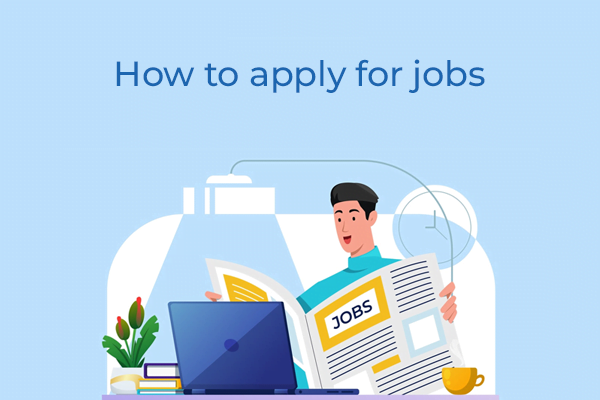To apply for full-time jobs in the USA, start by researching job opportunities that match your qualifications and experience. Customize your resume and cover letter for each job and submit your application by following the instructions in the job posting, which may include filling out an online application form and uploading your documents.
Overview of the Job Market in the USA

The job market in the USA is diverse and offers many opportunities across various industries. As of April 2022, the unemployment rate was 4.2%, indicating a relatively stable job market. Some of the top industries include healthcare, technology, finance, and retail. The demand for skilled workers in these industries is high, and they often offer competitive salaries and benefits. Remote work has become increasingly popular due to the COVID-19 pandemic, leading to more job opportunities in this sector. However, some industries, such as hospitality and tourism, have been negatively impacted by the pandemic. Overall, the job market in the USA is competitive, and it’s important to have the necessary qualifications and skills to stand out to employers.
Key Skills Required To Apply For Full-Time Jobs In The USA
The key skills required to apply for full-time jobs in the USA vary depending on the industry and job role. However, some general skills that are in high demand across many industries include:
- Communication skills: The ability to communicate effectively with colleagues, customers, and clients is crucial for success in many job roles.
- Technical skills: Proficiency in relevant software and technical tools is often necessary, especially in industries such as technology and finance.
- Critical thinking and problem-solving skills: The ability to analyze complex information and solve problems is highly valued by employers.
- Teamwork and collaboration: The ability to work effectively as part of a team is essential for many job roles.
- Time management and organization: The ability to prioritize tasks and manage time effectively is important in most jobs.
- Adaptability and flexibility: The ability to adapt to new situations and be flexible with work hours or tasks is increasingly important in today’s fast-paced work environment.
- Leadership skills: For managerial or leadership roles, strong leadership skills, such as the ability to motivate and manage a team, are important.
Identifying the Industries and Companies That Match Your Goals
Identifying the industries and companies that match your goals is an important step in finding the right job. Here are some tips:
- Assess your goals and interests: Think about your career goals and what industries align with your interests and strengths.
- Research industries and companies: Research industries and companies that align with your goals and interests. Look at company websites, job boards, and industry publications to learn more about potential opportunities.
- Consider company culture: Look for companies whose culture aligns with your values and work style. This can be important for job satisfaction and career growth.
- Networking: Networking can help you learn more about industries and companies that match your goals. Attend industry events, connect with professionals on LinkedIn, and reach out to your personal network for advice and recommendations.
- Job shadowing and informational interviews: Consider job shadowing or conducting informational interviews with professionals in industries or companies that interest you. This can help you learn more about the day-to-day work and company culture.
Crafting an Effective Resume and Writing a Compelling Cover Letter

Crafting an effective resume and writing a compelling cover letter are important steps in the job application process. Here are some tips:
Resume:
- Keep it concise and targeted to the job you are applying for.
- Use keywords from the job posting to highlight relevant experience and skills.
- Highlight achievements and measurable results in previous roles.
- Use bullet points and clear formatting for easy readability.
- Tailor your resume for each job you apply for.
Cover Letter:
- Address it to the hiring manager if possible.
- Use a clear and professional tone.
- Start with an attention-grabbing opening sentence.
- Highlight your relevant skills and experience that match the job requirements.
- Provide specific examples of your achievements and skills.
- End with a strong closing statement that expresses your enthusiasm for the job.
Applying for Jobs
When applying for jobs, it’s important to follow a few key steps to increase your chances of success. Here are some tips:
- Research job opportunities: Look for job opportunities that match your skills, experience, and interests. Research companies and industries to find potential opportunities.
- Customize your application: Tailor your resume and cover letter for each job application, highlighting relevant experience and skills. Use keywords from the job posting to increase your chances of getting noticed by applicant tracking systems.
- Follow application instructions: Follow the application instructions carefully, which may include submitting an online application or emailing your documents to the hiring manager. Make sure you include all required documents, such as a resume and cover letter, and submit them before the deadline.
- Prepare for interviews: If you are selected for an interview, research the company and prepare for common interview questions. Dress professionally and arrive on time for the interview.
- Follow up: After submitting your application or completing an interview, follow up with the hiring manager to express your continued interest in the job. This can help you stand out from other applicants and show your enthusiasm for the job.
Preparing for Interviews
Preparing for an interview is an important step in the job application process. Here are some tips to help you prepare:
- Research the company: Learn as much as you can about the company, including its mission, values, products or services, and any recent news or developments. This will show the interviewer that you are interested and engaged.
- Review the job description: Review the job description and think about how your skills and experience match the job requirements. This will help you prepare for specific questions related to the job.
- Prepare responses to common interview questions: Think about how you would answer common interview questions, such as “Tell me about yourself” and “What are your strengths and weaknesses?” Practice your responses out loud to build confidence.
- Practice with a mock interview: Practice with a friend or family member, or use an online resource to conduct a mock interview. This can help you get comfortable with the interview process and receive feedback on your responses.
- Dress appropriately: Dress professionally for the interview, even if it is conducted remotely. This shows that you take the interview seriously and are prepared.
- Prepare questions to ask: Prepare a list of questions to ask the interviewer about the company, the job, and the culture. This shows that you are interested and engaged in the job opportunity.
Common Mistakes to Avoid
When applying for jobs and preparing for interviews, there are common mistakes to avoid. Here are some tips to help you avoid these mistakes:
- Not customizing your application: Sending a generic resume and cover letter without tailoring it to the job you are applying for is a common mistake. Make sure to highlight relevant experience and skills in your application.
- Being unprepared for the interview: Failing to research the company, not practicing responses to common interview questions, or not having questions prepared to ask the interviewer can make you appear unprepared and disinterested in the job.
- Being late or not showing up for the interview: Arriving late or not showing up for an interview can make a negative first impression and may disqualify you from the job.
- Being negative about previous employers or experiences: Avoid speaking negatively about previous employers or experiences, as this can make you appear difficult to work with.
- Failing to follow up: Not following up after an interview or application can make you appear disinterested in the job. Follow up with the hiring manager to express continued interest and enthusiasm.
References:

